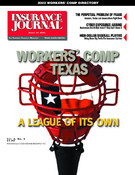Berkshire Hathaway’s boss Warren Buffett didn’t become America’s most successful investor, and one of its richest men, by making mistakes, so when General Re suffered a $2.4 billion hit from the WTC attacks, everyone waited to see what the impact would be on Berkshire’s earnings, and how he would handle it.
On March 9 the giant investment company reported a net profit of $795 million for the year 2001, compared to $3.3 billion the year before, a 76 percent drop. Even worse, if $842 million in capital gains were removed Berkshire would have had an operating loss for the year of $47 million.
In his annual letter to shareholders, Buffett admitted that, although he had foreseen the possibility of a Sept. 11 type disaster, he hadn’t reacted. “Why, you might ask, didn’t I recognize the above facts before September 11th?” he wrote. “The answer, sadly, is that I did—but I didn’t convert thought into action. I violated the Noah rule: Predicting rain doesn’t count; building arks does. I consequently let Berkshire operate with a dangerous level of risk—at General Re in particular. I’m sorry to say that much risk for which we haven’t been compensated remains on our books, but it is running off by the day.”
In acknowledging that the Sept. 11 attacks were beyond any previous experience, but still happened, Buffett confirmed the insurance industry’s increasing need to develop probabilistic modeling to try and gauge the full spectra of possible risks, not just those that have happened before. A company the size of General Re, backed by Berkshire, can afford such losses—once. But the terrorist attacks brought home in the most forceful way possible the necessity of adequately analyzing the risks and pricing the coverage accordingly.
Buffett’s unwavering commitment to underwriting discipline is clear in his list of the three “key principles” observed by the best underwriters:
1. They accept only those risks that they are able to properly evaluate (staying within their circle of competence) and that, after they have evaluated all relevant factors including remote loss scenarios, carry the expectancy of profit. These insurers ignore market-share considerations and are sanguine about losing business to competitors that offer foolish prices or policy conditions.
2. They limit the business they accept in a manner that guarantees they will suffer no aggregation of losses from a single event or from related events that will threaten their solvency. They ceaselessly search for possible correlation among seemingly-unrelated risks.
3. They avoid business involving moral risk: No matter what the rate, trying to write good contracts with bad people doesn’t work.
After Sept. 11 and Enron the insurance industry needs someone like Buffett more than ever. His frank analysis, general candor and refusal to adopt the latest spin techniques stand in sharp contrast to the blather issuing from people like Enron’s Ex-CEO Jeffrey Skilling, who had the gall to tell a Senate Committee that he didn’t know what his company was doing because he wasn’t a CPA. Buffett’s not a CPCU, but you can bet he knows what his insurance companies are doing.
Note: Buffett’s letter can be read in its entirety on the Berkshire Web site: http://www.berkshirehathaway.com.
Was this article valuable?
Here are more articles you may enjoy.


 Lemonade Books Q4 Net Loss of $21.7M as Customer Count Grows
Lemonade Books Q4 Net Loss of $21.7M as Customer Count Grows  World’s Growing Civil Unrest Has an Insurance Sting
World’s Growing Civil Unrest Has an Insurance Sting  Jury Finds Johnson & Johnson Liable for Cancer in Latest Talc Trial
Jury Finds Johnson & Johnson Liable for Cancer in Latest Talc Trial  Zurich Insurance Profit Beats Estimates as CEO Eyes Beazley
Zurich Insurance Profit Beats Estimates as CEO Eyes Beazley 


